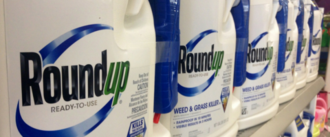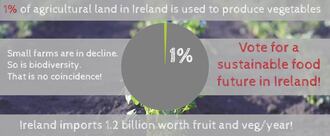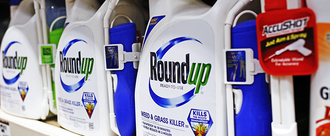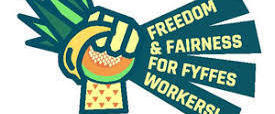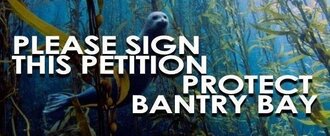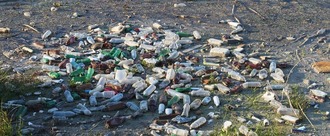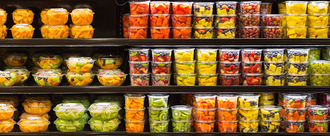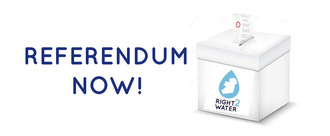- Featured
- Animal Rights
- Anti-racism
- Arts & Culture
- Children
- Climate
- Corporate accountability
- Crime
- Disability rights
- Economic
- Education
- Environment
- Food and Sustainable Production
- Gender Equality
- Governance and Transparency
- Health
- Housing
- LGBT Rights
- Mental health
- Northern Ireland
- Planning
- Privacy and Data Protection
- Rural Inequality
- Social Justice
- Trade
- Transport and Infrastructure
- Workers' Rights
- More
-
Marks & Spencer stop overcharging your Irish customersM&S made £115.7 million profit this year. M&S customers that made this possible. We are tired of being ripped off. Excuses such as currency changes do not explain why customers are being overcharged. https://www.irishtimes.com/business/retail-and-services/m-s-charges-irish-shoppers-up-to-39-more-than-uk-counterparts-for-christmas-products-1.3252787110 of 200 Signatures
-
Stop Spraying Roundup in Co. CorkRoundup is ‘potentially carcinogenic’ according to the World Health organisation and is being sprayed in places such as playgrounds close to where children play. https://www.scientificamerican.com/article/widely-used-herbicide-linked-to-cancer/303 of 400 SignaturesCreated by Siobhan O'Donoghue
-
Vote for a sustainable food future in Ireland!Ireland finds itself under increasing pressure to reduce its agricultural GHG emissions. Climate change is upon us and is a serious threat to our environment, social and economic world, subsequently affecting our ability to continue a business-as-usual approach to food production. The state cannot continue to ignore the fact the expansionist agenda in agriculture is not working. It is not environmentally, economically or socially sustainable. Environmentally Unsustainable: Under Food Harvest 2020 and Food Wise 2025, our emissions under a best case scenario are set to rise by 6/7% to 2020 Over 53% of water pollution is directly related to agriculture, with one in three rivers and lakes now at risk of further pollution. What’s more, biodiversity continues to decline, with rare species on the verge of extinction Economically Unsustainable: Ireland’s agri-sector is dominated by small farmers, who are struggling to survive. Farmers find themselves caught between pressures in trying to get a fair price for produce and a CAP ( European Common Agricultural Policy) that rewards the bigger land-owner. Farm incomes continue to decline, a fact blamed on falling milk and grain prices, with the OECD-FAO outlook predicting that markets will continue to remain weak Socially Unsustainable: A shocking and unacceptable fact is that only 1% of Ireland’s agricultural land is used to grow vegetables. Ireland has to import vegetables worth 1.2 billion euro each year, making us vulnerable to fluctuations on the market. Earlier this year, a drought in Spain resulted in higher prices for vegetables. Food prices hikes impact everyone forcing many to substitute vegetables with cheaper, nutritionally poor, energy dense foods. Leading to various health problems. Climate change, political instabilities and other factors can affect imports, if imports stopped today we would have approximately 4 weeks of fresh produce left on our shelves. We are not food secure! We stand on the side of small farmers, who risk it all, day in day out, to produce healthy food, true custodians of the land, protecting the environment, preserving biodiversity, keeping skills alive and ensuring that future generations have the opportunity to produce nutritionally good food. These farmers continue to be pushed to the fringes, by the state and the EU. With this petition we want to show that we stand with these farmers. That we care and all want a sustainable food future. If you care about what’s on our plate, care about local economies and about a sustainable future. Make you voice heard by signing this petition. Let’s speak as one voice to the Irish government and tell them: - to support small farmers financially - to support farmers in diversifying their holdings - to offer supports to increase the amount of vegetables produced in Ireland for food security - to increase environmental standards in agriculture beyond carbon footprints and give incentives to those who meet and surpass those standards - to practice the polluter pays principle and heavily fine those who continue to pollute our land and waterways - to increase reforestation with native species in and around farms, to support farmers in transitions to agroforestry 1. http://www.epa.ie/pubs/reports/air/airemissions/2020_GHG_Projections_2016_Bulletin.pdf 2. http://www.independent.ie/irish-news/water-quality-in-one-in-three-irish-rivers-and-lakes-is-at-risk-of-deteriorating-35850649.html 3. http://www.thatsfarming.com/news/curlew-ireland 4. http://www.independent.ie/business/farming/beef/beef-farmers-will-again-struggle-to-cover-costs-in-2017-35290234.html 5. http://www.irishtimes.com/news/ireland/irish-news/ifa-president-says-farmers-again-struggling-to-make-a-living-1.2057112 6. http://www.independent.ie/business/farming/schemes/system-failure-massive-difference-in-cap-payment-rates-35118778.html 7. http://www.irishtimes.com/business/agribusiness-and-food/average-family-farm-income-down-9-to-24-060-1.3102770 8. http://www.agri-outlook.org/20 of 100 SignaturesCreated by Nathalie Markiefka

-
Ban now the use of Glyphosate based and other toxic Weedkillers used by Roscommon County CouncilThese chemical based weedkillers are highly carcinogenic and linked to a variety of potentially fatal diseases. Monsanto's Roundup weedkiller, Pathclear, Gallup, Pistol, Weedol and Mossgo are to name but a few of the weedkillers currently on the market that contain the cancer causing chemical glyphosate which is lethal to all living organisms. Ireland has the second highest level of glyphosate in our surface water in the EU and the third highest death rate of cancer in Europe. To ensure a safer, cleaner living environment for our current and future generations we want a complete ban of glyphosate weedkiller. We are extremely concerned that our Agricultural sector/farmers are bombarded with misinformation and pressure from government bodies that are directly lobbied by toxic chemical companies. 1. https://www.irishtimes.com/news/environment/farmers-weapons-of-mass-destruction-carry-cancer-fears-1.3148492 2. http://greennews.ie/why-is-ireland-diluting-legislation-on-banning-hormone-changing-chemicals/ 3. https://www.euractiv.com/section/agriculture-food/news/france-tables-eu-wide-non-agricultural-pesticide-ban/368 of 400 SignaturesCreated by Patricia Keane
-
Ban the use of Glyphosate by Leitrim County CouncilThese chemical based weedkillers are highly carcinogenic and linked to a variety of potentially fatal diseases. Monsanto's Roundup weedkiller, Pathclear, Gallup, Pistol, Weedol and Mossgo are to name but a few of the weedkillers currently on the market that contain the cancer causing chemical glyphosate which are lethal to all living organisms. Ireland has the second highest level of glyphosate in our surface water in the EU and the third highest death rate of cancer in Europe. To ensure a safer, cleaner living environment for our current and future generations we want a complete ban of glyphosate weedkiller. We are extremely concerned that our Agricultural sector/farmers are bombarded with misinformation and pressure from government bodies that are directly lobbied by toxic chemical companies. http://greennews.ie/why-is-ireland-diluting-legislation-on-banning-hormone-changing-chemicals/ https://www.euractiv.com/section/agriculture-food/news/france-tables-eu-wide-non-agricultural-pesticide-ban/622 of 800 SignaturesCreated by Cara Crews
-
Justice for Fyffes Workers in Costa Rica and Honduras!Food workers and trade unions in the food export sector of Honduras and Costa Rica continue to be subjected to unsafe working conditions and not having their legal rights fulfilled. The estimated 25,000 people employed in the melon export sector in Honduras, of which 70% are women, regularly work 12-14 hour days, 7 days a week. The International Labour Rights Forum (2012) reports that 85% of workers earn less than the minimum wage [1]. Fyffes has been at the centre of several shocking scandals involving trade union violations and abuse of workers in Honduras and Costa Rica. A report by the US Department of Labor (2015) [2] detailed a litany of exploitative practices, ongoing labour code violations and ill-treatment of workers by the Fyffes subsidiary SurAgro in Honduras, including: That the company failed to pay the minimum wage, the 13th and 14th month bonuses, the seventh day bonus, and overtime; Failed to provide personal protective equipment and potable water; imposed a 300 HNL (US $14.40) penalty for missing a day of work (even with permission from a supervisor) in addition to that day’s salary; Threatened workers with dismissal for speaking with the Honduran Secretariat of Labor and Social Security (STSS) The general union in the United Kingdom, GMB, has called the actions of SurAgro one of the worst cases they have recorded, having documented “a shocking litany of abuse and exploitation on the part of Fyffes subsidiaries in Honduras” [3] and commented that “Fyffes... have no respect for domestic or international law governing workers’ rights and must be brought to book” [4]. In January 2016, workers at the Fyffes subsidiary became the first workers in the melon export sector to unionise and a local branch of the agriculture trade union STAS was formed. The following day, four trade union leaders were locked up in an office and threatened by the Chief of Security until they signed a document renouncing their union membership [5]. In an equally sinister occurrence, it was reported by the International Trade Union Confederation that on 13 April 2017, the trade unionist Moisés Sánchez (General Secretary of STAS’s sub-branch at Fyffes’ subsidiary in Honduras) was kidnapped, beaten and threatened with death if he continued his trade union work [6]. In May 2017 Fyffes was suspended from the Ethical Trading Initiative [ETI], an alliance of companies, trade unions and NGOs that promotes respect for workers' rights around the globe, finding that “the actions and approach taken by SurAgro [the Fyffes-owned Honduran melon plantation at the centre of the allegations] … contravene the open approach to legitimate trade union activities that ETI would expect within the supply chain to an ETI member” [7]. Despite the sale of Fyffes to the Japanese Sumitomo Corporation in early 2017, the Irish business news website Fora reported in June 2017 that David McCann and the “senior management team” based at the Fyffes head office in Dublin were handling the negotiations between the complainants, ETI and Fyffes [8]. Therefore, the Latin America Solidarity Centre is joining with other trade unions, NGOs and international Civil Society Organisations and demanding this actions from Fyffes.125 of 200 SignaturesCreated by Thais Mantovani
-
Legislate now to Ban Oil and Gas Drilling off Irish CoastPetition Update December 2020: In mid-December, we are going to deliver this petition and letters signed by both civil society groups from across the globe and members of the Houses of the Oireachtas urging Minister Eamon Ryan to support the granting of a money message from the Government so the Climate Emergency Bill can progress to committee stage as soon as possible. Petition Update September 2020: Not Here Not Anywhere has been campaigning to ban offshore drilling since 2017, and in that time we have seen progress and changes in government policy. In the 2020 Programme for Government agreed by Fianna Fail, Fine Gael, and Greens stated the following on oil and gas drilling "End the issue of new licenses for the exploration and extraction of gas, on the same basis as the recent decision concerning oil exploration and extraction" [1]. Now that Eamon Ryan is the Minister for Climate Action, he has the power to legislate and ban offshore oil and gas drilling outright. Recently, we submitted a Parliamentary question to find out when the legislation when going to be enacted. We got the below response from Minister Ryan "While there is no requirement for legislative underpinning, I and my Department will evaluate whether any further actions would be useful in terms of providing maximum clarity." [2]. We disagree with the Minister’s assessment, if the current government falls with no legislation passed it could lead to future licenses been issued under a new administration. Also, if legislation was passed it would be a major victory for the climate movement both in Ireland and globally and we would be joining other countries around the world which have shown this climate leadership [3]. We need to shed our climate laggard status, legislate to ban offshore oil and gas drilling, and KEEP IT IN THE GROUND. Original petition: On 11th July, just one week after onshore fracking was banned in Ireland, Minister of Communications, Climate Action and Environment, Denis Naughten, granted consent to oil & gas drilling by Providence Resources PLC in the Porcupine Basin off our south-west coast [4]. They expect to find 5 billion barrels of oil [5]. In an Orwellian twist, a “Department of Climate Action” has allowed for the burning of 5 billion barrels of oil when international climate experts state that 80% of the known fossil fuels have to stay in the ground if we want to avoid going over the safe 2 degrees limit of global warming [6]. Any investment in fossil fuel industry and infrastructure will result in what is known as “carbon lock-in”, taking us on a one-way unstoppable trip to dangerous levels of global warming that threaten global health and eco-systems [7]. Oil and gas exploration is also deadly for Ireland’s unique dolphin, whale and porpoise population [8] and plankton, the basis of the marine ecosystem [9]. Yet, Minister Naughten has refused to confirm if drilling will stop if a threat to the population is found [10]. We call on Minister Naughten to retract the Providence Resources permit immediately. Furthermore, we call on the Minister to follow the lead of France [11] and ban all new oil and gas exploration in Irish waters. We need to halt all dead investments in the fossil fuel industry and prepare a just transition to an economy that can provide workers with real, sustainable long-term jobs that can provide for their families and their future [12]. ------------------------------------------------------------------------------------------------------------------------------------ [1]https://www.greenparty.ie/wp-content/uploads/2020/06/2020-06-15-ProgrammeforGovernment_Corrected-Final-Version.pdf [2]https://www.oireachtas.ie/en/debates/question/2020-09-15/162/#pq_162 [3]https://www.looptt.com/content/new-zealand-next-list-ban-offshore-drilling [4] http://www.independent.ie/business/world/providence-resources-commences-drilling-off-the-southwest-coast-of-ireland-35921724.html [5] http://www.proactiveinvestors.co.uk/companies/amp/news/180745 [6] http://www.carbontracker.org/wp-content/uploads/2014/09/Unburnable-Carbon-Full-rev2-1.pdf [7]http://priceofoil.org/2016/09/22/the-skys-limit-report/ [8] http://news.nationalgeographic.com/news/energy/2014/02/140228-atlantic-seismic-whales-mammals/ [9] https://www.theverge.com/2017/6/23/15861932/offshore-drilling-airgun-seismic-surveys-zooplankton-death-oceans [10] https://www.kildarestreet.com/debates/?id=2017-02-07a.382 [11]http://www.independent.co.uk/news/world/europe/france-ban-new-oil-gas-exploration-stop-granting-licences-macron-hulot-renewable-energy-drive-a7806161.html [12] http://www.impact.ie/climate-change-workers-communities-must-protected-just-transition-carbon-free-economy-says-impact/7,361 of 8,000 SignaturesCreated by Not Here Not Anywhere - NHNA

-
Bantry Bay Says No to the Mechanical Extraction of Native Kelp ForestInadequate advertising took place for the issue of this licence. No public consultation meetings were held to inform the residents of Bantry Bay of this proposed mechanical harvest by a company from Tralee. No regard is being shown to the pristine marine environment in Bantry Bay which is home to many species protected by Irish, European and International legislation i.e. White Tailed Eagles, Otters, Choughs to name but a few. An Environmental Impact Assessment is not required for this licence! An extensive Environmental Impact Assessment should be done before any mechanical harvesting of native kelp is allowed in any Irish coastal waters. No regard has been shown for the people who rely on tourism and marine activities such as fishing in the bay to make a living. The Kelp forest slows the wave action approaching the land, so removal of this kelp forest may lead to more coastal erosion along the Bantry Bay coast.2,621 of 3,000 SignaturesCreated by John Connor
-
Don't Bottle ItBottled water is an invented consumer need.Thirty years ago the Irish public laughed at the idea of being sold a product that you could get from the tap for next to no cost. Today we feel as though bottled water is just a normal, or even essential, item to be included in our shopping baskets. In 2016, Irish consumers spent around €76.5 million on bottled water. We are sending about 800 million plastic bottles to be processed every year and are spending about €38 million annually on disposing of plastic bottles alone. This money could be used for investment in public drinking fountains, or for improving our public water infrastructure. By choosing to not consume bottled water, you will not only reduce the environmental impacts of plastics, but you will also eliminate a senseless daily expense. Plastic bottles pollute our oceans. About 80 percent of plastics found in our oceans come from land-based sources. In 2016, the United Nations World Oceans Assessment reported that as plastics entre the oceans they breakdown into microplastics. Plastics ingested by animals, such as fish, seabirds and marine mammals, can harm the intestines, and results in infection or death. Plastics also leach an assortment of dangerous chemicals into the water, and also act as a carrier for invasive species which can contaminate remote areas of the globe. The production and distribution of bottled water is a waste of resources. Research carried out by the Pacific Institute on the "energy implications of bottled water" in the United States worked out that bottled water is estimated to cost 2,000 times more than tap water to produce. The bottled water industry in the United States required an energy input equivalent to 54 million barrels of oil and roughly three times this amount is required to satisfy global bottled water demand. This adds around 2.5 million tons of carbon dioxide to our atmosphere every year. The high energy cost of bottling water is not the only way in which this industry is needlessly wasteful. One litre of bottled water takes three litres of water to be produced. Fresh safe drinking water is a valuable, and over exploited resource that every living organism on this planet depends upon. It is not an overstatement to argue that the continued use of single-use plastic water bottles should be considered nonsensical, wasteful and extraordinarily expensive. By eliminating bottled water from your shopping bag you are helping us move towards meeting four Sustainable Development Goals. Often the United Nations Sustainable Development Goals are thought of as only being relevant for protecting the most vulnerable ecosystems, and supporting the most disempowered communities, on our planet. People often forget that to achieve the Sustainable Development Goals by 2030, social, economic and environmental problems that are endemic within western consumer-lead countries must be considered as integral to the project. Our seemingly inconsequential habits have direct effects on the health of the planet, and the livelihoods of some of the world's most vulnerable communities in the world. We need to become aware of the consequences of our actions, but we also need to be responsive, and take brave steps towards a truly sustainable future. Let's reduce our use of plastic bottles in Ireland, and all place pressure on the Irish government to stop selling, or providing, bottled water in public institutions. Don't Bottle It! Be Brave we can make this change.225 of 300 SignaturesCreated by Rhiannon Thompson

-
Tell Supermarkets to create plastic-free aisle in every storeAround 300 million tons of plastic are produced globally each year, yet just 12 per cent is recyclable [1]. There are natural biodegradable alternatives to plastics available today so their ever increasing use can no longer be justified. The Feb. 2016 'New Plastics Economy: Rethinking the future of plastics' report analysis indicates (i) that 95% of the value of plastic packaging material, worth $80-120 billion annually, is lost to the economy, and (ii) that, on the current track, there could be more plastics than fish in the ocean (by weight) by 2050. The most important voice of reason that a supermarket can hear is that of the customer. By signing this petition you are helping to get the message across to key decision makers in the grocery sector that you no longer want to be part of the planetary plastic problem. That you want alternatives so this massive problem can finally start to be addressed, so future generations have a cleaner world to live in free from the dangers that a plastic filled ocean represents. There is a large demand for plastic free options so retailers should benefit if facilitating this for customers. Retailers who take a lead on this should see increased brand value, positive word of mouth and greater customer loyalty. The need for innovation in this area will spur job creation and new inventions that will be good for the economy too. It is clear to see now that proper disposal of plastic is a burden on all parties involved, particularly for the natural environment that is already starting to break under the burden. The situation with plastics has gotten way out of hand and it is up to all parties involved to act now. [1] http://www.telegraph.co.uk/science/2017/02/10/supermarkets-urged-create-plastic-free-aisle-every-store/4,245 of 5,000 SignaturesCreated by Dylan Regan

-
Save Farmers Market in Cork like Skibbereen MarketFarmers markets across Cork are under threat. Skibbereen Farmers Market is a fundamental part of the food culture of West Cork. New bye laws will generally restrict and could alter the way our market is run - moving us away from being at the centre and soul of food innovation in Ireland towards a standardised heavily regulated stale industry. http://www.corkcoco.ie/co/web/Cork%20County%20Council/Departments/Planning/Casual%20Trading%20Laws A farmers market is the heart and soul of each community, village, town and local area....as unique and individual as the environment changes with each location. A farmers market is dynamic, changing and evolving with the seasons and times; we love this about Skibbereen and don't want it to change. The specific changes that these new bye laws will mean that the location will change, restrict the number of stalls and traders, force new rules on traders. All of this will mean result in the market loosing control and introduce a level of micromanaging that is unprecedented.2,943 of 3,000 SignaturesCreated by Madeline McKeever
-
Support a referendum to stop water privatisationA decision is imminent on the Bill to insert into the Constitution an amendment which would rule out any future privatisation of water, or water services. Forty TDs have signed the Bill including Independents4Change, Sinn Fein, AAA/PBP and a number of independent TD’s. A number of others including the Green Party, the Labour Party and the Social Democrats have said publicly that they would support a referendum on public ownership of our water, so the Bill has a real chance of passing. However, this Bill will only pass if supported by Fianna Fail. We are calling on all TD's to prove they oppose water privatisation by supporting the Bill. At this very moment in time, any government, including the current one, could legislate to sell off our public water system. Furthermore, even if a government did not want to sell off our water, the EU, IMF or ECB could force the sale in the future – like they did in Greece and Portugal – so we have to protect our vital public water system now! The devastating impacts of water privatization have been felt all around the world. In the UK, one in four people are now experiencing water poverty. In the US, Rome and parts of France, tens of thousands are having their water shut off. We can prevent much of this by putting ownership of our water in the Constitution. More information here: http://tinyurl.com/zqn5gt66,200 of 7,000 SignaturesCreated by Right2Water Ireland Water is a human right


